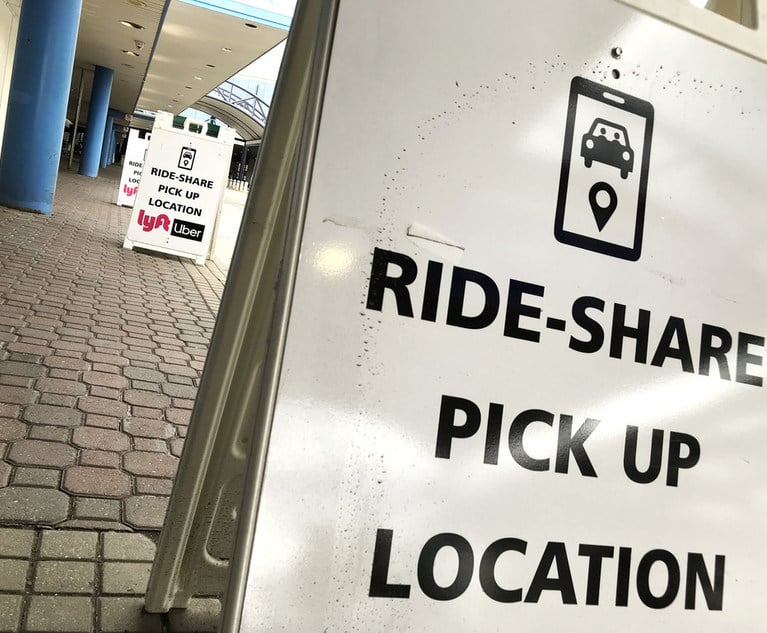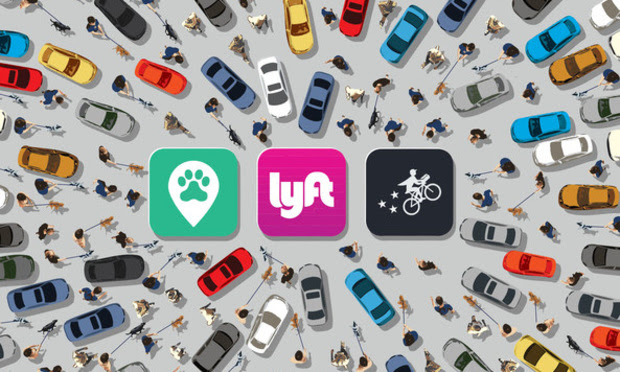Labor of Law: Takeaways from Nike's Salary Deep-Dive | 'Dynamex' Fallout | Around the Water Cooler & More
Takeaways from Nike's salary deep-dive—continuing the trend of company introspection. Plus: courts and companies are confronting the big California worker-classification decision. And scroll down for Around the Water Cooler. Thanks for reading Labor of Law!
July 26, 2018 at 12:00 PM
10 minute read
Welcome to Labor of Law. Nike Inc. workers pushed for better pay and thousands got it. Companies ever more are conducting pay audits—we'll take a look at the trend. Meanwhile, courts and businesses are grappling with the fallout from the California Supreme Court ruling that could upend the business model of gig companies. Scroll down for notable moves and who got the work.
➤➤ I'm Erin Mulvaney in Washington, covering labor and employment from the Swamp to Silicon Valley. Follow this weekly newsletter for the latest analysis and happenings. If you have a story idea, feedback or just want to say hi, I'm at [email protected] and on Twitter @erinmulvaney. Thanks for reading.
Nike's 'Deep Dive' on Pay Reflects Broad Trend
Nike's examination of its workplace came after a group of female workers at the Oregon-based company claimed persistent gender discrimination and sexual harassment. A group of senior executives departed the company amid what the New York Times described as a “sweeping investigation into workplace behavior.”
There was more big news this week—Nike said it was giving pay raises to thousands of employees following a close examination of pay inequality, according to a memo the Times reviewed.
Pay audits are increasingly more common, according to lawyers I've spoken with in recent weeks. They are a chance for businesses to review and address wage gaps. Some companies are publishing their pay data voluntarily, from outside pressure or from shareholders. Lawsuits in recent years have also targeted pay and promotion practices. It's possible the Ninth Circuit's ruling that banned prior salary to justify the wage gap could reach the U.S. Supreme Court this term.
In a client memo, Orrick, Herrington & Sutfcliffe analyzed the pay equity strategies at companies have taken on in recent years.
Some companies, such as GoDaddy and Salesforce, adopted a proactive approach to address equal pay issues, voluntarily releasing information regarding their gender pay practices. Intel, Apple, Facebook, and Microsoft disclosed gender pay gap information in reaction to shareholder demands, Orrick reported.
“The companies in the USA disclosing voluntarily usually have a good story to tell and can explain why gaps may exist. There is always a concern that after making a public disclosure, the analysis will be sought in discovery if there is future litigation,” said Mike Delikat, an Orrick partner in New York who heads the firm's global employment law practice. “The benefit from disclosing good data is the positive impact on recruitment and retention and a competitive advantage as being a company striving to achieve pay equity.”
The United Kingdom recently started requiring employers to report pay data to the government. Amid the UK's push for transparency, Delikat said companies are working hard as a competitive matter to improve their results next year and are instituting new efforts to recruit and retain women into higher paying positions. A similar push by the U.S. Equal Employment Opportunity Commission to track pay among gender and races at companies was scuttled by the Trump administration. It's unclear what moves the Trump-era EEOC will do to address the pay gap. Kelly Dermody, partner and chair of the employment practice group at Lieff Cabraser Heimann & Bernstein, is working on equal pay and promotion class actions against Goldman Sachs, Google Inc. and Microsoft. (If you missed my recent Q&A, check it out here.)
“If you really want to fix pay—it's easy. Just publish everyone's pay, and the next day you will have employees lined up at HR demanding justifications for pay disparities. Since employers don't want to make pay that transparent, the onus is on employers to make sure there is fairness in the pay decisions,” Dermody told me. “Going forward, I think there will be renewed efforts to create pay transparency laws, including requiring employers to publish pay ranges and midpoints so workers have an idea of where their own pay falls.”
She added, “More transparency forces companies to do what they should have done in the first place: Pay people the same for similar work and monitor results to ensure it is happening. The pushback I hear from management lawyers is, 'What if we did a serious pay analysis? Then we'll just get sued by someone like you?' To that I say, what's your goal? If your goal is to study pay without fixing gaps, then yes, you'll get sued. But if your goal is fair pay, you'll fix the gaps you find and actually comply with the law.”
California Courts, Gig Companies Face 'Dynamex' Fallout
In April, the California Supreme Court's decision in the case Dynamex Operations West v. Superior Court created a new worker classification standard—the “ABC” test—that is more rigid than the earlier scheme used to determine whether a worker is an independent contractor or employee.
The distinction is key in wage-and-hour disputes, as employees are entitled to benefits such as minimum wage and overtime. The new test will likely have wide ramifications for gig economy companies, which face a much steeper hurdle now to argue their workers are contractors.
One big question here is whether the new test will apply retroactively.
A court in Orange County says yes. Shannon Liss-Riordan, who is representing workers in classification cases against GrubHub, Postmates and Lyft, among others, says she'll point to the Orange County ruling in ongoing disputes.
Fisher Phillips partner Rich Meneghello wrote in a recent post, “Should businesses be protected for having relied upon the current law for years, or should they be held liable for years of possible wage and hour violations under a brand test just adopted out of the blue?” He added: “We'll see if other courts follow this same line of thinking, but for now, businesses appear to have a hurdle to overcome if they hope to limit the impact of the Dynamex case and shrink the application of the ABC test.”
Lawyers for Uber told the Ninth Circuit in a recent letter that the Orange County decision was not a game-changer. “Although the Superior Court found that Dynamex applied retroactively, it did so only as a matter of state law—it did not even purport to consider whether retroactive application of Dynamex would comply with federal due process,” Gibson, Dunn & Crutcher partner Theodore Boutrous said in the filing for Uber.
➤➤ Meanwhile, Seyfarth Shaw attorneys Kathleen Cahill Slaught, Peter Varneyand Michael Stevens write on the firm's Future Employer blog that more employers across the country are looking at expanding their benefits packages and policies to meet the demands of the gig economy.
“In light of the growth of the gig economy, many employers are increasing the number of categories of their employees and associates. As the categories increase, so too has employers' interest in being able to offer different benefits packages to different categories of employees.”
Who Got the Work
>> Morgan, Lewis & Bockius represents the law firm Stoel Rives in a new age-discrimination suit that a former attorney at the firm filed. Read the complaint.
>> A class action against Amazon in Trenton federal court claims 10,000 New Jersey warehouse workers faced barriers to overtime pay. Joseph Nuccio and Richard Rosenblatt of Morgan, Lewis & Bockius represent Amazon. Matthew Miller ofSwartz Swidler in Cherry Hill represents the plaintiffs. Read more here.
>> A federal judge in Newark dismissed AT&T's lawsuit seeking to compel arbitration of a discrimination claim lodged by an employee. The company maintained its arbitration policy was binding unless the employee opted out. New Jersey-based attorney Ron Wronko represented the plaintiff. AT&T's lawyers were Kenneth Gagefrom Paul Hastings in New York, working with Scott Silverman and Keith Rosenblatt of Littler Mendelson. Read more here.
New and Notable Moves
>> Wage-and-hour litigation partner John Yslas joins Seyfarth Shaw's labor and employment group in Los Angeles from Norton Rose Fulbright, where he headed the retail international business group. My colleague Xiumei Dong has more here.
>> Lance Gibbons rejoined Littler Mendelson as a shareholder in Washington. He previously was a partner at NT Lakis LLP. His return to the firm marks the eighth shareholder to join the firm since January.
Around the Water Cooler
>> A team from Jones Day is warning about protracted fee litigation if a Seventh Circuit ruling is not reversed. “Although this particular fee award may not be of great importance, the standard of review for all fee awards assuredly is,” Jones Day's Eric Dreiband told the U.S. Court of Appeals for the Seventh Circuit. [NLJ]
>> A sexual harassment suit filed against Dentons and a former managing director at the firm is meritless and “misappropriates” the #MeToo movement, the legal giant and the executive's lawyers said in separate court filings. [The American Lawyer]
>> “Employers should not assume that they will escape liability should a prospective or current employee allege discrimination based on the employee's sexual orientation,” David Ruffner of Lash & Goldberg writes. [Daily Business Review]
>> Major tech companies, including Google, Apple and Facebook, rely heavily on a steady workforce of contract workers. At Google earlier this year, the contractors outnumbered the direct employees for the first time in the company's 20-year history. [Bloomberg]
>> Vermont became the first state to ban a legal practice used in private sexual harassment settlements that bars employees who settle cases from ever working for that employer again. Susan Gross Sholinsky, an employment and labor lawyer at Epstein Becker & Green in New York City, said the clause is meant to protect a company from being sued again in the future. “No-rehire clause or not, I don't know a company that would go out and rehire an employee that they just settled a case with—it doesn't make sense for them,” Sholinsky said. [PBS NewsHour]
>> A New York state labor board decision granted Uber workers employee status in a worker classification dispute. Employment attorney David Raff: “It will be interesting to see if Uber now starts to develop a new model, or wants to contest this, or accepts the fact that as far as New York is concerned, [drivers] will be employees in most instances” for the purposes of unemployment insurance.'” [Politico]
>> The stage is set for a legal challenge against President Donald Trump's orders aimed at labor organizations. In the U.S. District Court for the District of Columbia, Judge Ketanji Brown Jackson heard arguments in a suit challenging executive action against union-related activity. [Washington Post]
That's all for this week. Thanks for reading. Shoot me a note with story ideas, feedback or tips: [email protected]
This content has been archived. It is available through our partners, LexisNexis® and Bloomberg Law.
To view this content, please continue to their sites.
Not a Lexis Subscriber?
Subscribe Now
Not a Bloomberg Law Subscriber?
Subscribe Now
NOT FOR REPRINT
© 2025 ALM Global, LLC, All Rights Reserved. Request academic re-use from www.copyright.com. All other uses, submit a request to [email protected]. For more information visit Asset & Logo Licensing.
You Might Like
View All
Labor of Law: As Workers Suffer With Long Covid, Employers May Rethink Accommodations for Other Disabilities

Labor of Law: Federal Noncompete Ban Would Be Far From Last Word on Issue

Labor of Law: New Federal Rule Could Upend State Efforts to Count Ride-Share Drivers as Contractors

Labor of Law: Employer Statements on Abortion Could Spur Discrimination, Hostile Work Environment Claims
Trending Stories
Who Got The Work
J. Brugh Lower of Gibbons has entered an appearance for industrial equipment supplier Devco Corporation in a pending trademark infringement lawsuit. The suit, accusing the defendant of selling knock-off Graco products, was filed Dec. 18 in New Jersey District Court by Rivkin Radler on behalf of Graco Inc. and Graco Minnesota. The case, assigned to U.S. District Judge Zahid N. Quraishi, is 3:24-cv-11294, Graco Inc. et al v. Devco Corporation.
Who Got The Work
Rebecca Maller-Stein and Kent A. Yalowitz of Arnold & Porter Kaye Scholer have entered their appearances for Hanaco Venture Capital and its executives, Lior Prosor and David Frankel, in a pending securities lawsuit. The action, filed on Dec. 24 in New York Southern District Court by Zell, Aron & Co. on behalf of Goldeneye Advisors, accuses the defendants of negligently and fraudulently managing the plaintiff's $1 million investment. The case, assigned to U.S. District Judge Vernon S. Broderick, is 1:24-cv-09918, Goldeneye Advisors, LLC v. Hanaco Venture Capital, Ltd. et al.
Who Got The Work
Attorneys from A&O Shearman has stepped in as defense counsel for Toronto-Dominion Bank and other defendants in a pending securities class action. The suit, filed Dec. 11 in New York Southern District Court by Bleichmar Fonti & Auld, accuses the defendants of concealing the bank's 'pervasive' deficiencies in regards to its compliance with the Bank Secrecy Act and the quality of its anti-money laundering controls. The case, assigned to U.S. District Judge Arun Subramanian, is 1:24-cv-09445, Gonzalez v. The Toronto-Dominion Bank et al.
Who Got The Work
Crown Castle International, a Pennsylvania company providing shared communications infrastructure, has turned to Luke D. Wolf of Gordon Rees Scully Mansukhani to fend off a pending breach-of-contract lawsuit. The court action, filed Nov. 25 in Michigan Eastern District Court by Hooper Hathaway PC on behalf of The Town Residences LLC, accuses Crown Castle of failing to transfer approximately $30,000 in utility payments from T-Mobile in breach of a roof-top lease and assignment agreement. The case, assigned to U.S. District Judge Susan K. Declercq, is 2:24-cv-13131, The Town Residences LLC v. T-Mobile US, Inc. et al.
Who Got The Work
Wilfred P. Coronato and Daniel M. Schwartz of McCarter & English have stepped in as defense counsel to Electrolux Home Products Inc. in a pending product liability lawsuit. The court action, filed Nov. 26 in New York Eastern District Court by Poulos Lopiccolo PC and Nagel Rice LLP on behalf of David Stern, alleges that the defendant's refrigerators’ drawers and shelving repeatedly break and fall apart within months after purchase. The case, assigned to U.S. District Judge Joan M. Azrack, is 2:24-cv-08204, Stern v. Electrolux Home Products, Inc.
Featured Firms
Law Offices of Gary Martin Hays & Associates, P.C.
(470) 294-1674
Law Offices of Mark E. Salomone
(857) 444-6468
Smith & Hassler
(713) 739-1250











